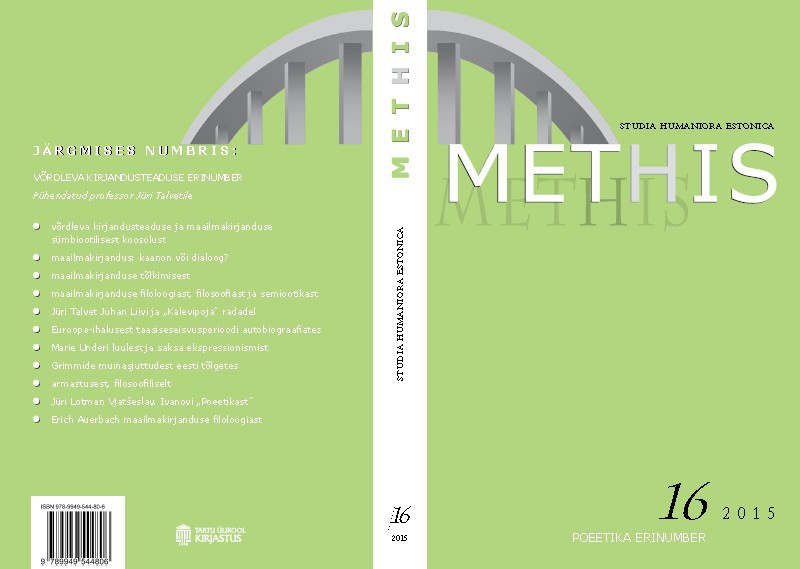Näitamise ambivalentne poeetika: J. G. Ballardi „Crash” / The Ambivalent Poetics of Showing in J. G. Ballard's „Crash“
DOI:
https://doi.org/10.7592/methis.v13i16.12456Keywords:
poeetika, narratoloogia, allegooria, kirjanduslik stiil, kirjeldamine, poetics, narratology, allegory, literary style, describingAbstract
Teesid: Artiklis käsitlen värske pilguga 1991. aastal ajakirjas Science Fiction Studies aset leidnud debatti J. G. Ballardi skandaalse romaani „Crash“ ümber. Toona küsiti, kas selles esitatud tehnoloogiat ja inimkehi segustava maailma puhul on tegu allegoorilise moraalse hoiatuse või iselaadse perversse realismiga. Täiendan seda debatti poeetilisest küljest – vaatlen põhjalikult romaani näitavat esituslaadi, loetelulisust, tehnilist sõnavara, transtsendentsusele osutavat kujundlikkust ning peategelase-, jutustaja- ja autori-tasandi ühtsust – ning järeldan, et „Crashi“ läbinisti ambivalentne poeetika jätab teose võrdselt avatuks mõlemale tõlgendusvõimalusele.
S U M M A R Y
My article revisits a well-known discussion about morality in J. G. Ballard's ”Crash“ that surrounded the appearance of Jean Baudrillard's essay of the same name in a special section of Science Fiction Studies (Nov 1991). In this debate N. Katherine Hayles and Vivian Sobchack strongly oppose Baudrillard's claim that there ”is no affectivity behind [the world that Crash depicts]: no psychology, no ambivalence or desire, no libido or death drive“ to Ballard's novel, and, accordingly, no moral point or warning either. In contrast, Hayles and Sobchack argue that the novel warns us about the transformative influence of contemporary technology.
To shed new light on this opposition (whose sides I briefly introduce), I undertake a thorough analysis of ”Crash's“ main poetic features: the prevalence of showing over telling, the recurrence of accounts over descriptions, the thoroughly technical vocabulary, allusions towards transcendence, and the interpretive anxiety created by a first-person narrator that bears the author's name. I map the contrast between Ballard's disinterested style of writing and the apparent affective charge of his characters while showing how this contrast generates a deep ambivalence that enables both moral and morally indifferent interpretations of the novel. The reader is never told what to think about the obscene events that occur and this provokes him to make difficult moral decisions about the novel. The ambivalence of ”Crash's“ poetics has the subversive potential to dislocate and reconsider the so far predominantly marginalized role of psychopathology and perversion in contemporary techno-culture.


